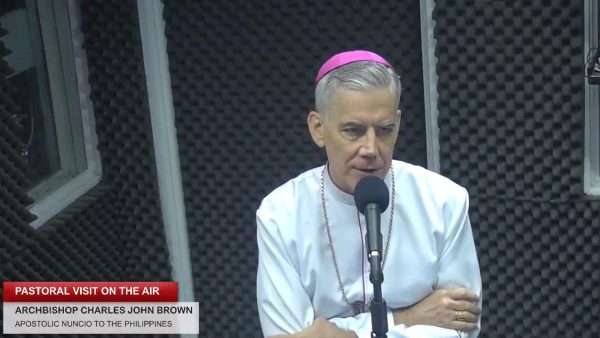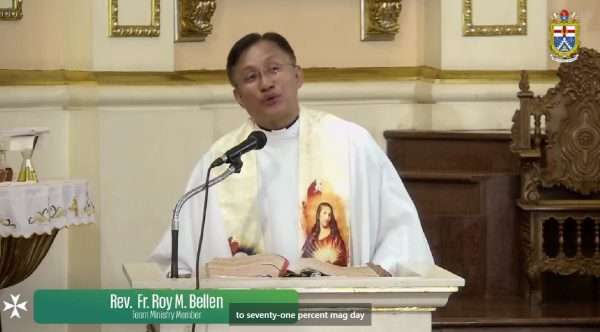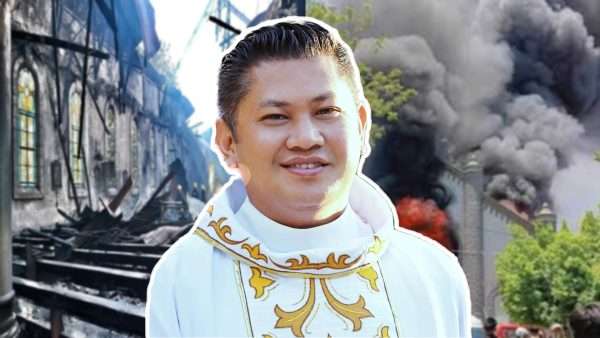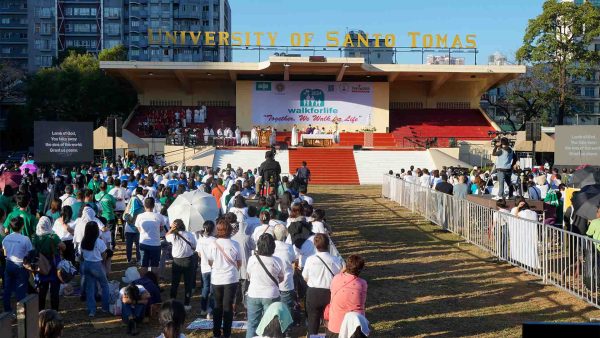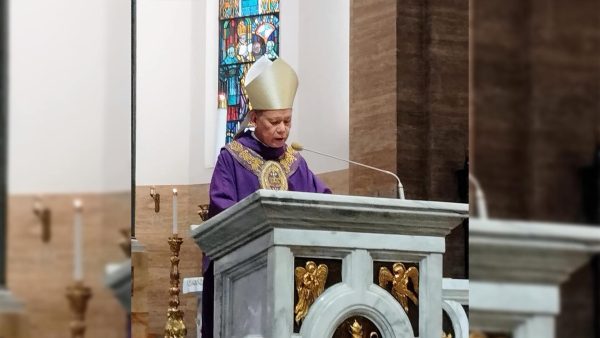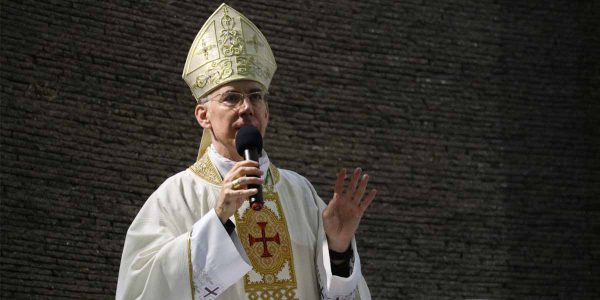226 total views
Nawa ang bawat isa ay tularan ang ipinakitang halimbawa ni Hesus sa kanyang pag-aalay ng sariling buhay para sa sanlibutan sa pamamagitan ng pagsasabuhay ng maliliit na gawa para sa kapwa.
Ito ang mensahe ni Manila Archbishop Luis Antonio Cardinal Tagle kaugnay na rin sa pagdiriwang ng buong Simbahang kristiyano ng Muling Pagkabuhay o Easter.
Ayon kay Cardinal Tagle si Hesus ay nag-alay ng kaniyang buhay, hindi para tumanyag kundi mailapit sa Diyos ang mga nawalay sa pananampalataya sa pamamagitan ng pag-ibig.
“Marami pong kayamanan ang pagdiriwang ng Kuwaresma at Mahal na araw, pero isang bagay po ang nais bigyan ng pansin—ang Alay Kapwa si Hesus ay hindi lamang namatay, inialay niya ang kanyang buhay para saaan?,” pahayag ni Cardinal Tagle.
Giit ni Cardinal Tagle, hindi magtatapos ang paggunita ng Kuwaresma at Mahal na Araw kundi ang pagpapatuloy ng panawagan sa bawat isa na isabuhay ang ‘Alay Kapwa’ mula sa maliliit na gawain at pagsisikap na pagmalakasakitan ang ating kapwa tulad na rin ng ipinakitang pagmamamahal ng Panginoon sa bawat isa.
“Hindi para tumanyag hindi para siya ay pansinin kundi pag-aalay ng buhay para sa kapwa upang ang kapwa na nahiwalay sa Diyos ay mailapit sa kanya sa pamamagitan ng pag-ibig tayo po ay sana sumunod kay Hesus sa pamamagitan ng pag-aalay ng ating panahon talento at yaman sa kapwa. Tularan natin si Hesus sa maliliit na mga gawa at sa ating marubdob na pagmamahal. Ang kwaresma ay hindi matatapos ito ay laging bahagi ng ating buhay.” mensahe ni Cardinal Tagle
Jesus, the rock of salvation.
Easter Reflections
His Eminence Luis Antonio Cardinal G. Tagle,
Archbishop of Manila, Philippines
The women who brought spices to anoint the body of Jesus asked each other on their way to the tomb, “Who will roll away the stone for us from the entrance of the tomb?” (Mark 16:3). Their concern was justified because the stone that covered the tomb was large. The stone was meant to seal the tomb. But heavy as it was, the stone was a not sufficient barrier for the Pharisees and chief priests who had pushed for the death of Jesus. They asked Pilate to allow guards to be stationed at the tomb to ensure that no one would steal the corpse of Jesus, then claim that he was risen as he had promised. Pilate granted their plea. “So, they went and made the sepulcher secure, putting seals on the stone and mounting a guard.” (Matthew 27:66). Those who plotted Jesus’ death made sure that he remained dead, locked up in the place of the dead, with stone and armed soldiers to prevent his exit, whether dead or alive. They feared his promise to rise from the dead might come true. They were anxious that they themselves might start putting their faith in the one they had executed. The earthly powers of Jesus’ time assumed that a large stone and armed guards would guarantee the permanence of death. They were afraid of Jesus and his promise of rising from the dead. They put their trust in stone and guards. But Mary of Magdala and the other women were not afraid of Jesus. They wanted to see and anoint his body. Their concern was removing the stone so they could approach him. “Who will roll away the stone?” Do not worry Mary Magdalene, Mary mother of James, and Salome. God will do roll away the stone! No rock, no soldier can subdue God. Nothing can chain Jesus, the Author of Life to the cold walls of a tomb. The stone was rolled away, the guards were so shaken they looked like dead men (Matthew 28:4). Sisters and brothers, what stones have we placed to prevent the spread of true life, genuine love, invigorating humaneness, authentic caring, pure justice? The stones of sin, selfishness, greed, indifference, hatred, lust, idolatry keep people and societies in tombs. What stones have we positioned to seal the tombs of the victims of corruption, injustice, vices, slavery, trafficking, abuse, discrimination, prostitution, murder, and ecological neglect? Who will roll away the stones so that Life may come forth from the places of death and spread its sweet light? We have the answer: God will do it. The stones will crumble. The guards will fall flat. The Risen One will walk calmly to meet us. Let us go and meet Him. Behold, the Rock of our salvation! A blessed Easter to all of you!
Come back to the Lord.
Message Lent and Easter
CBCP President Davao Archbishop Romulo Valles
My brothers and sisters in the Lord! I am grateful for this opportunity to share with you my Lenten and Easter message, my thoughts and reflections these days. I have to tell you that I have been very much inspired by the Lenten Message of our Holy Father for us this liturgical year. The Season of Lent In the days of the season of Lent, we are supposed to prepare for the glorious celebration of Easter.
In the words of Pope Francis: “Lent summons us and enables us to come back to the Lord wholeheartedly and in every aspect of our life.” In one of the Prefaces of Lent, we pray… “You have given your children a sacred time for the renewing and purifying of their hearts, that freed from disordered affections, they may so deal with the things of this passing world as to hold rather to the things that eternally endure.” That is why, at the beginning of Lent, we were reminded: “Remember that you are dust, and to dust you shall return.” Or, as in the popular Lenten song that quotes the prophet Hosea, the Lord says, “Come back to me with all your heart…” So, the real challenge and opportunity in these days of Lent is to return to the Lord and trust him to renew us. Lent is about to end, my dear brothers and sisters.
In fact it is ending this Holy Thursday, daytime; for in the evening Mass of the Lord‟s Supper, we will already start the celebration of the Easter Mysteries. The Church has kept the beautiful tradition of Lenten practices for us, to help us return to the Lord, and these are prayer, almsgiving and fasting. Thus, we ask ourselves as we are about to conclude the preparatory days of Lent: Have we prayed enough in silence, in the depths of our hearts, crying to the Lord, struggling to return to him? And, have we prayed with the Church community in her beautiful Lenten liturgy, in the sacraments, especially through the Sacrament of Reconciliation, listening to God‟s word, and participating in the table of the holy Eucharist so that, I hope by now, we have become closer to the Lord? And how about our almsgiving? Almsgiving, but not in the sense that we give because we have extra resources to give, but really giving of what we really have, including even ourselves. An almsgiving that is closer to the giving of Jesus of himself for us.
True alms-giving helps us to stay away from greed and self-centeredness and inspires us and allows ourselves to be Christ-like to other.















